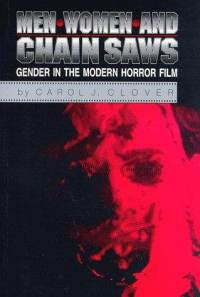

While most theorists label the horror film as a male-driven/male-centered genre, Clover points out that in most horror films, especially the slasher film, the audience, male and female, is structurally ‘forced’ to identify with the resourceful young female (the Final Girl) who survives the serial attacker and usually ends the threat (until the sequel anyway). One of the book’s major points concerns the structural positioning of what she calls the Final Girl in relation to spectatorship. One of the more important, if not groundbreaking, accounts/recuperations of the horror film from a feminist perspective is Carol Clover’s Men, Women, and Chainsaw. "It's easy to see why this book is considered such a landmark in film analysis.The Final Girl: A Few Thoughts on Feminism and Horrorīy Donato Totaro Volume 6, Issue 1 / January 2002 11 minutes (2741 words) "Fascinating, Clover has shown how the allegedly naïve makers of crude films have done something more schooled directors have difficulty doing - creating females with whom male veiwers are quite prepared to identify with on the most profound levels"- The Modern Review There is no condescension in this significant and probing discussion of psychology and sexuality and their role in lurid fantasy."-Desmond Ryan, Philadelphia Inquirer "Clover, takes the most extreme genre, horror flicks, seriously. "In her reading of both particular horror films and of film and gender theory, Clover does what every cultural critic hopes to: she calls into question our habits of seeing."-Ramona Naddaff, Artforum

"Clover actually bothers (as few have done before) to go into the theaters, to sit with the horror fans, and to watch how they respond to what appears on screen."-Wendy Lesser, Washington Post

"Clover makes a convincing case for studying the pulp-pop excesses of ‘exploitation' horror as a reflection of our psychic times."-Misha Berson, San Francisco Chronicle She suggests that the "low tradition' in horror movies possesses positive subversive potential, a space to explore gender ambiguity and transgress traditional boundaries of masculinity and femininity."-Andrea Walsh, The Boston Globe "Carol Clover's compelling challenges simplistic assumptions about the relationship between gender and culture. argues that most horror films are obsessed with feminism, playing out plots which climax with an image of (masculinized) female power and offering visual pleasures which are organized not around a mastering gaze, but around a more radical "victim-identified' look."-Linda Ruth Williams, Sight and Sound

Bubbling away beneath Clover's multi-faceted readings of slasher, occult, and rape-revenge films is the question of what the viewer gets out of them. " brilliant analysis of gender and its disturbances in modern horror films.


 0 kommentar(er)
0 kommentar(er)
